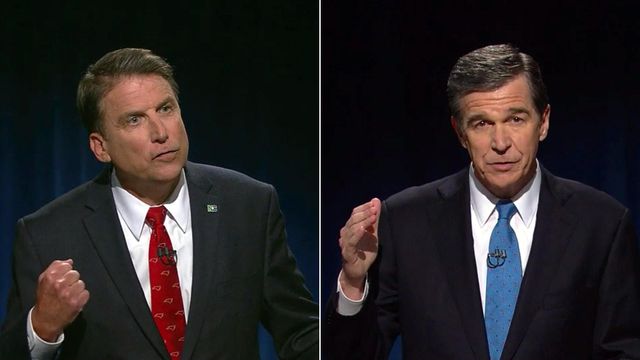Seven facts to keep in mind during gubernatorial debate
A week after clashing in their first televised debate, Republican Gov. Pat McCrory and Democratic Attorney General Roy Cooper will get another case to restate, or possibly misstate, their cases to the voters. Libertarian Lon Cecil will also be included in this final debate, hosted by WRAL News.
Posted — UpdatedThis will be the third meeting between Republican Gov. Pat McCrory and Democratic Attorney General Roy Cooper.
As for the topics the most recent McCrory-Cooper debate did cover, here are context of seven claims from the first debate that viewers are likely to hear again on Tuesday night.
1) McCrory says there was "record" unemployment when he took office.
"Unemployment was at a record 9.4 percent when I came into office," McCrory said during the first debate. "Believe me, it was a lot worse under Easley and Perdue, governors you (Cooper) strongly supported."
McCrory is about right about where the unemployment rate was when he took office. The federal Bureau of Labor Statistics and state Commerce Department peg unemployment at 9.5 percent in January 2012, the month McCrory took office.
It's worth knowing that unemployment in North Carolina hit its 40-year-high under Gov. Bev Perdue at 11.3 percent in January, February and March 2010. Perdue started her term in January 2008 with unemployment at 9.8 percent after it had spiked at the end of Gov. Mike Easley's eight years in office. By the time McCrory was sworn in, the rate had peaked and come down 1.8 percentage points.
In August, North Carolina's unemployment rate was 4.6 percent
During the same time period, the national unemployment rate followed a similar trajectory. It moved from 7.8 percent in January 2009 to a high of 9.9 percent in March and April 2010. In September, the national unemployment rate was pegged at 5 percent.
2) Cooper and McCrory trade claims on education.
At the same time, Cooper will insist per-pupil spending on public school students is among the bottom 10 states. The most recent census data, for the year 2014, puts North Carolina's spending 44th out of 50 states and the District of Columbia.
Both McCrory and Cooper said the state needs to do more for education. The question both of them will likely face Tuesday night is how to put more resources into K-12 spending without raising taxes.
3) Cooper claims that the state raided emergency funds for House Bill 2.
"Gov. McCrory took $500,000 directly out of the disaster relief fund, and you know what it's for? House Bill 2," Cooper said during the first debate.
Given the flooding from Hurricane Matthew, North Carolina's disaster recovery efforts has understandably come up in the campaign.
4) McCrory pins blame for House Bill 2 on Charlotte.
"It's one of the biggest fibs in our national press, and frankly our state press, in which they say the bathroom laws were made by Republicans," McCrory said during the last debate. "We had never brought this issue up. It was the mayor of Charlotte, with the strong support of the attorney general, who decided to put a mandate on the entire private sector who have public facilities."
But House Bill 2 went further, including writing an entirely new state nondiscrimination policy that excluded LGBT people from protections and preventing local government from using their contracting authority to extend nondiscrimination protections beyond the state standard. That bill was passed by the Republican-controlled General Assembly and signed by McCrory the same day.
5) Cooper continues to defend the crime lab.
"It is providing good service across our state," Cooper said of the State Crime Lab during the last debate.
6) Who owed North Carolina's unemployment debt?
"We got rid of a $2.6 billion debt that we owed to the federal government," McCrory said during the first debate.
However, that money wasn't something that individual taxpayers would have ended up owing. North Carolina would have never been able or required to raise its own sales and income taxes to repay that debt.
Unemployment claims are paid with special taxes levied on employers on a per-worker basis. If the state runs out of money to pay first-time claims, it borrows from the federal government. If at a certain point that money isn't repaid, taxes are stepped up on employers in order to repay the money.
That money could have risen to as much as $22 per year per employee had the system followed its pre-2013 course. Projections showed the $2.6 billion debt would have been paid sometime in 2020.
7) Has state policy on abortion become more restrictive?
Related Topics
• Credits
Copyright 2024 by Capitol Broadcasting Company. All rights reserved. This material may not be published, broadcast, rewritten or redistributed.






